google-site-verification: google85f203565cb16b4c.html
Making Better Thought-Movies One Truth At A Time
_________________________________
Being too quick to be rich or great may bring lots of money or position, but in the end much is lost in shame and disappointment
"Word Pictures" for Our Imagination
 |
Free Printable Devotional Sheets Thursday, July 24th |
Today's Daily Verse is found in Proverbs 20.21
"An inheritance obtained too early in life is not a blessing in the end." - NLT version
There's another version that suggests ultimate problems for those who obtain an inheritance dishonestly.
There are times when, under divine providence, men are advanced very quickly into positions of great wealth and/or authority...
Joseph
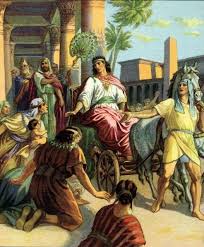
Genesis 41.14-45
"Pharaoh sent for Joseph at once, and he was quickly brought from the prison. After he shaved and changed his clothes, he went in and stood before Pharaoh. 15 Then Pharaoh said to Joseph, “I had a dream last night, and no one here can tell me what it means. But I have heard that when you hear about a dream you can interpret it.”
16 “It is beyond my power to do this,” Joseph replied. “But God can tell you what it means and set you at ease.”
17 So Pharaoh told Joseph his dream. “In my dream,” he said, “I was standing on the bank of the Nile River, 18 and I saw seven fat, healthy cows come up out of the river and begin grazing in the marsh grass. 19 But then I saw seven sick-looking cows, scrawny and thin, come up after them. I’ve never seen such sorry-looking animals in all the land of Egypt. 20 These thin, scrawny cows ate the seven fat cows. 21 But afterward you wouldn’t have known it, for they were still as thin and scrawny as before! Then I woke up.
22 “In my dream I also saw seven heads of grain, full and beautiful, growing on a single stalk. 23 Then seven more heads of grain appeared, but these were blighted, shriveled, and withered by the east wind. 24 And the shriveled heads swallowed the seven healthy heads. I told these dreams to the magicians, but no one could tell me what they mean.”
25 Joseph responded, “Both of Pharaoh’s dreams mean the same thing. God is telling Pharaoh in advance what he is about to do. 26 The seven healthy cows and the seven healthy heads of grain both represent seven years of prosperity. 27 The seven thin, scrawny cows that came up later and the seven thin heads of grain, withered by the east wind, represent seven years of famine.
28 “This will happen just as I have described it, for God has revealed to Pharaoh in advance what he is about to do. 29 The next seven years will be a period of great prosperity throughout the land of Egypt. 30 But afterward there will be seven years of famine so great that all the prosperity will be forgotten in Egypt. Famine will destroy the land. 31 This famine will be so severe that even the memory of the good years will be erased. 32 As for having two similar dreams, it means that these events have been decreed by God, and he will soon make them happen.
33 “Therefore, Pharaoh should find an intelligent and wise man and put him in charge of the entire land of Egypt. 34 Then Pharaoh should appoint supervisors over the land and let them collect one-fifth of all the crops during the seven good years. 35 Have them gather all the food produced in the good years that are just ahead and bring it to Pharaoh’s storehouses. Store it away, and guard it so there will be food in the cities. 36 That way there will be enough to eat when the seven years of famine come to the land of Egypt. Otherwise this famine will destroy the land.”
Joseph Made Ruler of Egypt
37 Joseph’s suggestions were well received by Pharaoh and his officials. 38 So Pharaoh asked his officials, “Can we find anyone else like this man so obviously filled with the spirit of God?” 39 Then Pharaoh said to Joseph, “Since God has revealed the meaning of the dreams to you, clearly no one else is as intelligent or wise as you are. 40 You will be in charge of my court, and all my people will take orders from you. Only I, sitting on my throne, will have a rank higher than yours.”
41 Pharaoh said to Joseph, “I hereby put you in charge of the entire land of Egypt.” 42 Then Pharaoh removed his signet ring from his hand and placed it on Joseph’s finger. He dressed him in fine linen clothing and hung a gold chain around his neck. 43 Then he had Joseph ride in the chariot reserved for his second-in-command. And wherever Joseph went, the command was shouted, “Kneel down!” So Pharaoh put Joseph in charge of all Egypt. 44 And Pharaoh said to him, “I am Pharaoh, but no one will lift a hand or foot in the entire land of Egypt without your approval.”
45 Then Pharaoh gave Joseph a new Egyptian name, Zaphenath-paneah. He also gave him a wife, whose name was Asenath. She was the daughter of Potiphera, the priest of On. So Joseph took charge of the entire land of Egypt.
Daniel
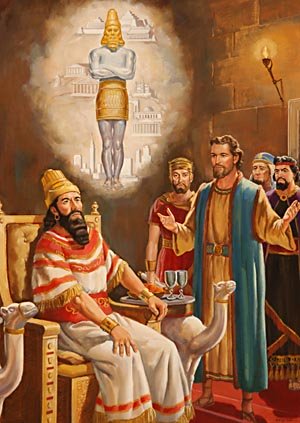
Nebuchadnezzar Rewards Daniel
Daniel 3.46,48
46 "Then King Nebuchadnezzar threw himself down before Daniel and worshiped him, and he commanded his people to offer sacrifices and burn sweet incense before him."
48 "Then the king appointed Daniel to a high position and gave him many valuable gifts. He made Daniel ruler over the whole province of Babylon, as well as chief over all his wise men."
Some get power and end up in ruins...
Absalom
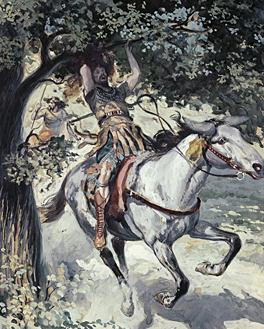 |
Absalom 2 Samuel 15.10 "But while he was there, he sent secret messengers to all the tribes of Israel to stir up a rebellion against the king. “As soon as you hear the ram’s horn,” his message read, “you are to say, ‘Absalom has been crowned king in Hebron.’” 2 Samuel 18.9-17 tells what happened to him... |
2 Samuel 18.9-17 "During the battle, Absalom happened to come upon some of David’s men. He tried to escape on his mule, but as he rode beneath the thick branches of a great tree, his hair got caught in the tree. His mule kept going and left him dangling in the air. 10 One of David’s men saw what had happened and told Joab, “I saw Absalom dangling from a great tree.”
11 “What?” Joab demanded. “You saw him there and didn’t kill him? I would have rewarded you with ten pieces of silver and a hero’s belt!”
12 “I would not kill the king’s son for even a thousand pieces of silver, ” the man replied to Joab. “We all heard the king say to you and Abishai and Ittai, ‘For my sake, please spare young Absalom.’ 13 And if I had betrayed the king by killing his son—and the king would certainly find out who did it—you yourself would be the first to abandon me.”
14 “Enough of this nonsense,” Joab said. Then he took three daggers and plunged them into Absalom’s heart as he dangled, still alive, in the great tree. 15 Ten of Joab’s young armor bearers then surrounded Absalom and killed him.
16 Then Joab blew the ram’s horn, and his men returned from chasing the army of Israel. 17 They threw Absalom’s body into a deep pit in the forest and piled a great heap of stones over it. And all Israel fled to their homes.
Adonijah
1 Kings 1.5-9
Adonijah Claims the Throne
5 About that time David’s son Adonijah, whose mother was Haggith, began boasting, “I will make myself king.” So he provided himself with chariots and charioteers and recruited fifty men to run in front of him. 6 Now his father, King David, had never disciplined him at any time, even by asking, “Why are you doing that?” Adonijah had been born next after Absalom, and he was very handsome.
7 Adonijah took Joab son of Zeruiah and Abiathar the priest into his confidence, and they agreed to help him become king. 8 But Zadok the priest, Benaiah son of Jehoiada, Nathan the prophet, Shimei, Rei, and David’s personal bodyguard refused to support Adonijah.
9 Adonijah went to the Stone of Zoheleth near the spring of En-rogel, where he sacrificed sheep, cattle, and fattened calves. He invited all his brothers—the other sons of King David—and all the royal officials of Judah.
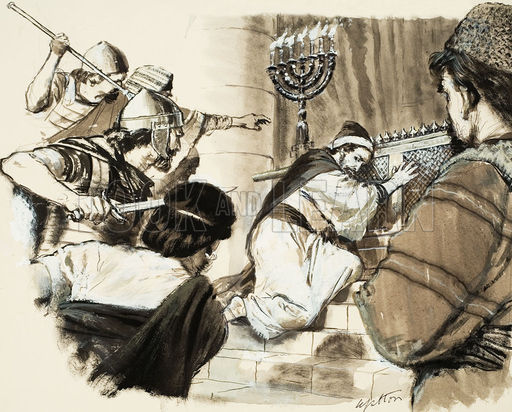
How did that end?
1 Kings 2.25
"25 So King Solomon ordered Benaiah son of Jehoiada to execute him, and Adonijah was put to death."
Many hastily became kings...look what happened!
1 Kings 16.8-32
Elah Rules in Israel
8 Elah son of Baasha began to rule over Israel in the twenty-sixth year of King Asa’s reign in Judah. He reigned in the city of Tirzah for two years.
9 Then Zimri, who commanded half of the royal chariots, made plans to kill him. One day in Tirzah, Elah was getting drunk at the home of Arza, the supervisor of the palace. 10 Zimri walked in and struck him down and killed him. This happened in the twenty-seventh year of King Asa’s reign in Judah. Then Zimri became the next king.
11 Zimri immediately killed the entire royal family of Baasha, leaving him not even a single male child. He even destroyed distant relatives and friends. 12 So Zimri destroyed the dynasty of Baasha as the Lord had promised through the prophet Jehu. 13 This happened because of all the sins Baasha and his son Elah had committed, and because of the sins they led Israel to commit. They provoked the anger of the Lord, the God of Israel, with their worthless idols.
14 The rest of the events in Elah’s reign and everything he did are recorded in The Book of the History of the Kings of Israel.
Zimri Rules in Israel
15 Zimri began to rule over Israel in the twenty-seventh year of King Asa’s reign in Judah, but his reign in Tirzah lasted only seven days. The army of Israel was then attacking the Philistine town of Gibbethon. 16 When they heard that Zimri had committed treason and had assassinated the king, that very day they chose Omri, commander of the army, as the new king of Israel. 17 So Omri led the entire army of Israel up from Gibbethon to attack Tirzah, Israel’s capital. 18 When Zimri saw that the city had been taken, he went into the citadel of the palace and burned it down over himself and died in the flames. 19 For he, too, had done what was evil in the Lord’s sight. He followed the example of Jeroboam in all the sins he had committed and led Israel to commit.
20 The rest of the events in Zimri’s reign and his conspiracy are recorded in The Book of the History of the Kings of Israel.
Omri Rules in Israel
21 But now the people of Israel were split into two factions. Half the people tried to make Tibni son of Ginath their king, while the other half supported Omri. 22 But Omri’s supporters defeated the supporters of Tibni. So Tibni was killed, and Omri became the next king.
23 Omri began to rule over Israel in the thirty-first year of King Asa’s reign in Judah. He reigned twelve years in all, six of them in Tirzah. 24 Then Omri bought the hill now known as Samaria from its owner, Shemer, for 150 pounds of silver. He built a city on it and called the city Samaria in honor of Shemer.
25 But Omri did what was evil in the Lord’s sight, even more than any of the kings before him. 26 He followed the example of Jeroboam son of Nebat in all the sins he had committed and led Israel to commit. The people provoked the anger of the Lord, the God of Israel, with their worthless idols.
27 The rest of the events in Omri’s reign, the extent of his power, and everything he did are recorded in The Book of the History of the Kings of Israel. 28 When Omri died, he was buried in Samaria. Then his son Ahab became the next king.
Ahab Rules in Israel
29 Ahab son of Omri began to rule over Israel in the thirty-eighth year of King Asa’s reign in Judah. He reigned in Samaria twenty-two years. 30 But Ahab son of Omri did what was evil in the Lord’s sight, even more than any of the kings before him. 31 And as though it were not enough to follow the sinful example of Jeroboam, he married Jezebel, the daughter of King Ethbaal of the Sidonians, and he began to bow down in worship of Baal. 32 First Ahab built a temple and an altar for Baal in Samaria.
- Those who want power and become wealthy should remember -
1 Timothy 6:9
"But people who long to be rich fall into temptation and are trapped by many foolish and harmful desires that plunge them into ruin and destruction."
Be content.
Psalms 16.2,5
"I said to the Lord, “You are my Master! Every good thing I have comes from you.”
v.5 "Lord, you alone are my inheritance, my cup of blessing. You guard all that is mine.
Smart choice!

See you tomorrow...
In the meantime:
Have you called or emailed someone to invite them to join us in our daily study in Proverbs? It would be great if you did that today! Thanks.
Making Better Thought-Movies One Truth At A Time
_________________________________
Bible Study Lessons
- Abandonment
- Abilities
- Abortion
- Abuse
- Addiction
- Accusations
- Adultery
- Anger
- Apathy
- Ashamed
- Attitudes
- Backsliding
- Betrayal
- Bitterness
- Born Again
- Chance
- Conscience
- Deceit
- Deception
- Discipline
- Discretion
- Eyes of GOD
- False Witness
- Fear of the Lord
- Fear -Lord #2
- Flattery
- Friendship
- Fool, A
- Foolishness
- Forgiveness
- Giving
- Inheritance
- Injustice
- Instruction
- Judgment
- Kindness
- Knowledge
- Lawlessness
- Lies, Lying
- Misunderstand
- Pleasure
- Pride
- Problems
- Soft Answers
- Speech
- Understanding
- Vengeance
- Wisdom
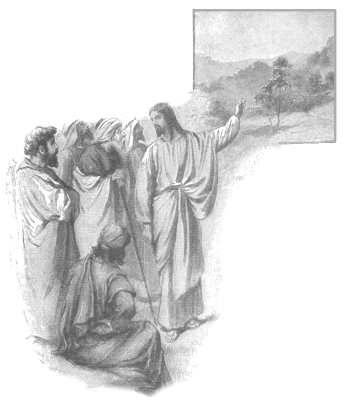
Parables by Jesus
- Children of Bridechamber
- New Patch, Old Garment
- New Wine, Old Wineskins
- Treasures Old and New
- Spontaneous Growth
- Mustard Seed
- The Leaven
- Hidden Treasure
- Pearl of Great Price
- Dragnet
- The Soils
- Children at Play
- Wise and Foolish Builders
- The Wheat and the Tares
- Empty House
- Uncompleted Tower
- Rash King's Warfare
- Chief Seats
- Pharisee and Publican
- Two Debtors
- Unmerciful Servant
- Barren Fig Tree
- Bond Servant
- Unjust Steward
- Rich Fool
- Rich Man and Beggar
- Good Samaritan
- Laborers and the Hours
- Friend at Midnight
- Importunate Widow
- Lost Sheep
- Lost Coin
- Prodigal Son
- Elder Brother
- Two Sons
- Cruel Vine-Dressers
- Rejected Cornerstone
- Great Feast
- Wedding Robe
- Wise and Foolish Virgins
- Talents
- Good Shepherd